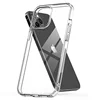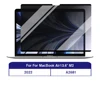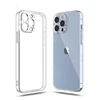For Apple enthusiasts, Apple events are a must-watch, not just because of the products involved, but also because of the little moments that happen. They’re just a few seconds or minutes of a larger presentation, but they stand out because of their profoundness–they’re an “ah ha!” moment that opens your eyes to something bigger.
These moments are often referred to when talking about Apple’s history or analyzing the company’s moves. In many instances, they’re the moments that define the event–or a whole era.
We could come up with a list of dozens of these moments, but we wanted to narrow it down to the 10 best. We decided to narrow the list down to standalone events, so no FaceTime, Apple silicon, or other WWDC keynote announcements). (We have a separate list of our favorite Mac moments from WWDC keynotes.) And we kept things chronological to prevent any arguments about which announcement is bigger (though obviously it’s the iPhone). Without further ado, here are the 10 best moments in Apple special event history
1984: Welcome to Macintosh
About 45 minutes pass before Steve Jobs (who started the event by reciting verse two from Bob Dylan’s “The Times They Are A-Changin’“) finally gets to the moment that started it all: the reveal of the Macintosh. Once Jobs inserts a startup disk, “Chariots of Fire” starts to play in the auditorium (In the 1980s, any staged, dramatic moment used Vangelis’ song in the background.), and after a few seconds, the word “MACINTOSH” scrolls horizontally across the all-in-one’s screen, followed by a splash screen where “insanely great” was written in cursive on the screen.
A few minutes later, the Macintosh itself speaks: “Hello, I am Macintach. It sure is great to get out of that bag.” It was a moment that changed everything not just for Apple but for all of technology.
A personal anecdote: I wasn’t at this event (I was in middle school), but I was in a reenactment of the event for the Steve Jobs movie. “Chariots of Fire” was not played at that event.
1997: The return of Steve Jobs
We’re sure you’re quite familiar with Steve Jobs leaving Apple in 1985 and the company’s struggles in the mid-1990s. “The last year in the Mac market felt like being on a bit of an emotional rollercoaster,” said Macworld’s then-CEO Colin Crawford during the 1997 Macworld Expo keynote. Apple acquired Next Inc. earlier that year, the company Jobs created after leaving Apple. NeXTSTEP provided the foundation for Mac OS X, and Jobs provided the foundation for all the rest.
Jobs taking the stage at that keynote was one of the biggest moments in the company’s history–if not the biggest. Apple and its customers needed a glimmer of hope, and Jobs provided it as soon as he appeared. At that moment, everyone thought that if anyone could save Apple, it was Jobs.
1998: The matrix and the iMac
Here’s a question for you longtime Apple users: Do you remember what Apple’s Mac lineup was like in the early- and mid-1990s? It was a mess–Apple had too many models. (Bonus points if you can describe the difference between Apple’s regular Mac lineup and the Performa Macs.) A couple of years after Steve Jobs’s return, he decided that they needed to simplify the Mac lineup into four sections: consumer desktops and portables, and pro desktops and portables. It was a moment that brought clarity to Apple’s lineup and an approach that helped boost sales. It’s a philosophy that the company still uses today, for the most part.
During that same keynote, Jobs unveiled the original G3 iMac to fill the consumer desktop part of that matrix. It was a computer like no other, graced the cover of several magazines, and was an instant icon. It had the spirit of the original Macintosh and solidified Jobs’ legacy in business and popular culture.
1999: ‘One more thing…’
During the 1999 Macworld Expo keynote, Steve Jobs introduced the iBook which brought wireless connectivity to the masses. It seemed like he was about to wrap up the show, but he paused and then said, “There is one more thing,” and he proceeded to introduce the AirPort, Apple’s first Wi-Fi router that looked like a UFO.
That was the first of many “One more thing” announcements. Jobs used it again later that year at the Seybold Seminars keynote to introduce the Apple Cinema Display–this time, he made it more dramatic and his delivery of the line made it clear that “One more thing” was going to be a thing. Apple eventually figured out that to add drama to “One more thing” it should be used for announcements that are more impressive than a new router or display–it was most recently used to introduce Apple Vision Pro. Now, at the end of Apple keynotes, we all wonder if that’s all there is, and wait to hear those three fateful words.
2001: Your whole music library in your pocket
The event for the original iPod was only for media, analysts, and special guests, and it was before the advent of streaming video. The crowd reaction is subdued throughout the whole event, but there’s an audible chuckle followed by applause when Jobs pulls the iPod out of his pocket. The small crowd didn’t know how seminal the moment was, but Steve did.
Another personal anecdote: I didn’t go to the iPod event, but my wife was there, sitting next to Philip Michaels and behind Jason Snell as Macworld representatives. Like the other attendees, she left the event with an iPod in her pocket and later showed it to me during dinner, which went cold while I marveled at the scroll wheel and the UI.
2006: Intel arrives
At the Macworld Expo in 2006, Intel’s Paul Otellini, clad in a bunny suit, made a dramatic entrance to the stage and greeted Steve Jobs with a chip wafer. They let everyone know that the two companies were ready for the transition.
This wasn’t Apple’s initial announcement that it was switching to Intel processors–that happened six months earlier at the WWDC 2005 keynote. The 2006 moment told the Apple market that, yup, this is really happening. It also let the world know that Apple was going to do whatever it took to not only remain relevant but to move forward with its technology, even if it meant converting rivals into partners.
2007: Three revolutionary products
An Apple mobile phone had been rumored for a while before its official reveal, so those of us who follow Apple closely were always on the lookout. Still, when Steve Jobs declares, “An iPod! A phone…are you getting it!” It’s one of Jobs’ greatest moments, and it was easy to get caught up in the fervor, even if some of us had an idea what was coming.
I was lucky enough to be at the iPhone announcement, which was at the Macworld Expo keynote. What’s funny about that moment in retrospect is that when Jobs started by saying there were three new products, the “widescreen iPod with touch controls” and the “revolutionary mobile phone” got huge responses from the audience, but the “breakthrough internet communications device” got only a smattering of applause. If we knew then what we know now (instant messaging, FaceTime, social media, etc.), the reaction would be very different–the response to the internet device would be thunderous.
2008: The envelope, please
Steve Jobs was a master showman. What made him great was that he didn’t do things just for show– he was excellent at providing context for what he did on stage. His actions had a profound effect on understanding the point he was making. A great example of this occurred during the MacBook Air reveal in 2008.
Jobs explained how thin the Air was by providing its measurements and comparing it to the thinnest PC laptop on the market. Most presenters would’ve thought that was enough, but to make it real and tangible to the audience, Jobs smoothly slid the Air out of an interoffice envelope. It gave people better context for the Air–the ohs, ahs, and laughs from the audience were everyone saying, “I get it.” It was genius.
2014: Watch and learn
The Apple Watch introduction was actually a “One more thing” item at the end of the 2014 iPhone event–Monday’s “Glowtime” event will happen exactly 10 years later. It was the first time Apple CEO Tim Cook launched a major new product. “We believe this product will redefine what people expect from its category,” he proclaimed. And that it did.
2020: The start of a new era
At WWDC in June 2020, Apple announced the Mac was switching from Intel processors to Apple’s own silicon. The WWDC announcement was a big moment on its own, but the actual introduction of the M1 chip and the first Macs to have Apple silicon was an even bigger one.
For about 10 minutes of this 49-minute event, Apple explained the components of its M1, explained how each is implemented, and showed how each performed against the Intel chips being replaced. It was eye-opening and exciting, and it truly felt like the Mac was entering a new era. Like 1984 all over again, it gave the Mac a new voice.
Bonus moment: Kanye West at the 2005 Apple Music event
Apple used to hold music events to announce new iPods and iTunes features. Those events had a musical guest at the end, and in 2005 the guest was Kayne West. West performed uncensored versions of his hits “Gold Digger” and “All Falls Down” and the audience of journalists, analysts, and special guests sat still and quiet for the whole performance, except for a couple who awkwardly danced in the aisle. I have never cringed so many times at an Apple event as I had at this one. (The “Mother Nature” sketch in 2023 came close.)
Apparently, Apple felt similarly, because there’s no footage of West’s performance anywhere online. Even the “complete” videos of the event, like the one above, have West’s performance cut off. The only hard evidence online of this event, besides the numerous media writeups, is a photo collection. It was a memorable moment for all the wrong reasons.





